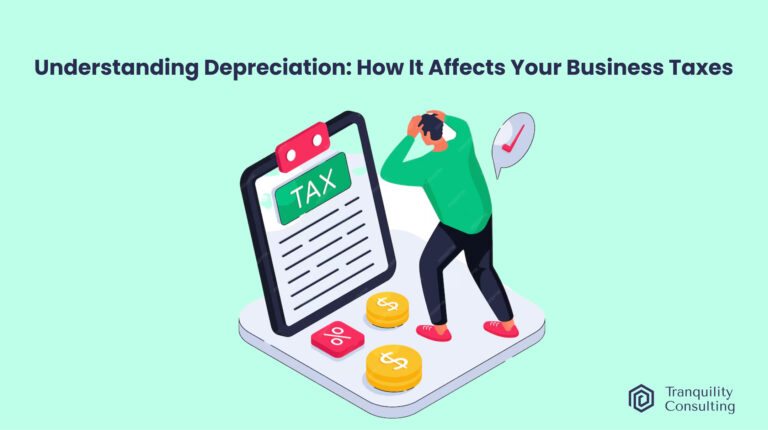As a business owner, understanding the concept of tax depreciation is important for managing your finances and optimizing your tax strategy. Depreciation plays a significant role in how you report the value of your business assets and can substantially impact your corporation taxes. In this comprehensive guide, we’ll explore tax depreciation, how it works, its effects on your business taxes, and how to claim it effectively.
What is Tax Depreciation?
Tax depreciation is an accounting method that allows businesses to deduct the cost of tangible assets over their useful life rather than expensing the entire cost in the year of purchase. This concept recognizes that assets lose value over time due to wear and tear, obsolescence, or other factors.
Important points about tax depreciation:
- It applies to long-term assets used in business operations
- It’s a way to match the cost of an asset with the revenue it generates
- Tax authorities recognize it as a legitimate business expense
How Tax Depreciation Works
The process of tax depreciation involves several steps and considerations:
- Identifying Depreciable Assets:
Not all business assets are depreciable. Generally, depreciable assets must meet the following criteria:
- Used for business or income-producing activities
- Have a determinable, useful life
- Expected to last more than one year
- Determining the Depreciation Method:
- Straight-line depreciation: The most common and simplest method, where the asset’s cost is evenly spread over its useful life.
- Declining balance method: Allows for higher depreciation in the early years of an asset’s life.
- Sum-of-the-years’-digits method: Another accelerated depreciation method.
- Units of production method: Bases depreciation on the asset’s usage rather than time.
- Calculating Depreciation:
The basic formula for calculating depreciation is:
Annual Depreciation = (Asset Cost – Salvage Value) / Useful Life.
- Recording Depreciation:
Depreciation is recorded as an expense on your income statement and reduces the asset’s value on your balance sheet. This process continues until the asset is fully depreciated or disposed of.
- Bonus Depreciation and Section 179:
Under the Tax Cuts and Jobs Act (TCJA) of 2017, bonus depreciation was expanded, allowing businesses to immediately deduct 100% of the cost of qualifying assets acquired and placed into service after September 27, 2017, and before January 1, 2023. This law change, described under IRC Section 168(k), provides significant tax relief by allowing businesses to front-load depreciation deductions. In taxable years starting after 2022 and ending on January 1, 2027, the 100% limit typically decreases by 20% annually.
How Does Tax Depreciation Affect Corporation Taxes?
Tax depreciation has a significant impact on your corporation taxes in several ways:
- Reduced Taxable Income:
Depreciation is considered a business expense, reducing your company’s taxable income. By spreading the cost of an asset over multiple years, you can lower your tax liability in each of those years.
- Timing of Tax Benefits:
Different depreciation methods can affect when you realize tax benefits. Accelerated methods like the declining balance method provide more significant deductions in the early years of an asset’s life, which can be advantageous for businesses looking to minimize taxes in the short term.
- Cash Flow Improvement:
Depreciation can improve your business’s cash flow by reducing tax liability. This additional cash can be reinvested in the business or used for other purposes.
- Asset Management:
Tracking depreciation helps you manage your assets more effectively. It provides insights into when assets might need replacement and can inform decisions about capital expenditures.
- Impact on Alternative Minimum Tax (AMT):
Depreciation deductions can also affect a company’s Alternative Minimum Tax (AMT) liability. Under the Tax Cuts and Jobs Act, AMT has been eliminated for corporations after 2017, but depreciation continues to influence other components of the tax code.
How to Claim Tax Depreciation on Business Assets
Claiming tax depreciation on your business assets involves several steps:
- Identify Depreciable Assets
Only certain assets qualify for tax depreciation. These include tangible assets such as equipment, machinery, vehicles, buildings, and computers. These assets must have a useful life beyond one year to be eligible for depreciation.
- Determine the Useful Life
The IRS has guidelines that dictate the useful life of different types of assets. For example, office furniture typically has a useful life of 7 years, while computers may have a useful life of 5 years.
- Choose a Depreciation Method
As mentioned earlier, the most common depreciation methods are straight-line, declining balance, and units of production. You must choose the appropriate method based on your business needs and asset type. Bonus depreciation and Section 179 can also be applied in the first year for faster deductions.
- Calculate Depreciation for Each Asset
To calculate and claim depreciation, you can use IRS Form 4562. This form requires details such as the cost of the asset, the depreciation method, and the date the asset was placed into service.
- Report on Your Tax Return
Depreciation expenses are reported on your business tax return. For corporations, depreciation is reported on IRS Form 1120, while small businesses may report it on Schedule C.
- Keep Detailed Records
IRS regulations require businesses to keep detailed records, including asset descriptions, purchase dates, and depreciation schedules. Proper record-keeping ensures compliance and reduces the risk of penalties or audits.
Strategies for Optimizing Tax Depreciation
To make the most of tax depreciation for your business:
- Plan Asset Acquisitions: Consider the timing of asset purchases. Acquiring assets near the end of the tax year can provide depreciation benefits for the entire year.
- Conduct Regular Asset Reviews: Review your asset inventory regularly to ensure you’re not depreciating assets that are no longer in use or have been disposed of.
- Leverage Accelerated Depreciation: When appropriate, use accelerated depreciation methods to front-load tax benefits and improve short-term cash flow.
- Consider Cost Segregation Studies: For businesses with significant real estate holdings, a cost segregation study can identify building components that can be depreciated over shorter periods, potentially increasing tax deductions.
- Stay Compliant with Recordkeeping: Maintain meticulous records of all depreciable assets to support your depreciation claims in case of an audit.
Conclusion
Tax depreciation is a powerful tool for managing your business’s tax liability and improving cash flow. By understanding how it works and implementing effective strategies, you can optimize your tax position while ensuring compliance with tax regulations. Remember that depreciation rules can be complex and subject to change, so working with tax professionals to develop a depreciation strategy tailored to your business needs is often beneficial.
FAQs
- What is tax depreciation, and why is it important for businesses?
- Tax depreciation allows businesses to deduct the cost of assets over time, reducing taxable income and improving cash flow.
- Which business assets qualify for tax depreciation?
- Tangible assets like equipment, machinery, vehicles, and buildings with a useful life beyond one year qualify for tax depreciation.
- What is the difference between straight-line and accelerated depreciation?
- Straight-line depreciation evenly spreads the cost over an asset’s useful life, while accelerated methods provide more deductions in the early years.
- How do I claim tax depreciation for my business assets?
- Use IRS Form 4562 to claim depreciation, report on your tax return, and keep detailed records of asset costs and depreciation schedules.
- How does tax depreciation affect a company’s cash flow?
- Tax depreciation reduces taxable income, leading to lower tax liability and improved cash flow, which can be reinvested in the business.
If you have any questions or need business-related tax consulting advice, please contact us at: [email protected]





